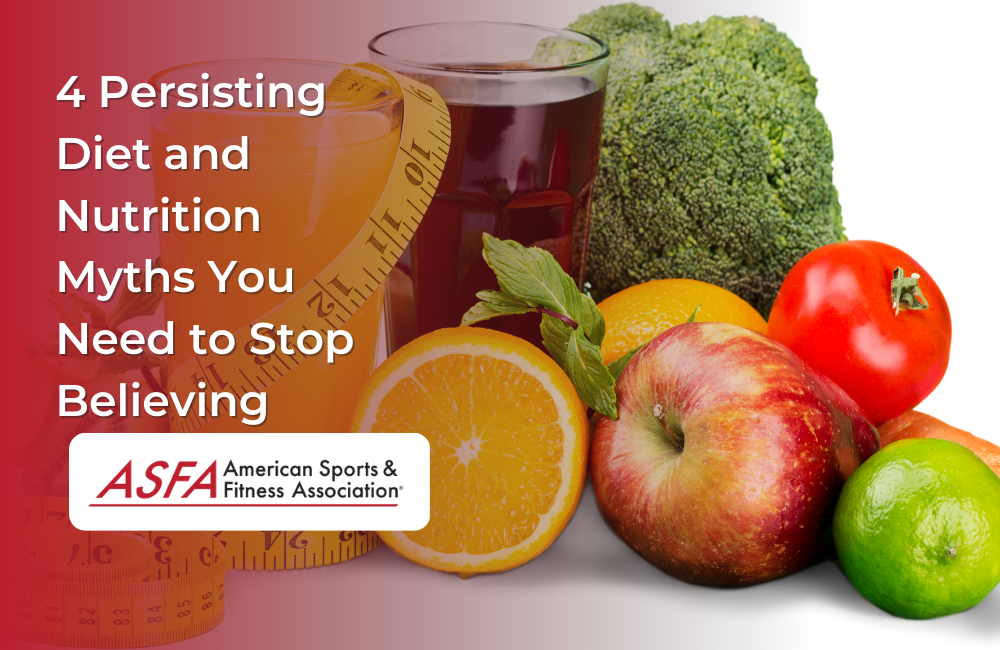
Debunking Persisting Diet and Nutrition Myths
When it comes to diet and nutrition, there is a lot of misinformation out there. From fad diets to miracle supplements, it can be challenging to navigate the world of nutrition and make informed choices. In this blog post, we'll debunk four persisting diet and nutrition myths that you need to stop believing and provide you with evidence-based information.
One of the most persistent nutrition myths is that carbs are bad for you. While it's true that some carbs, like refined sugars and white flour, can be harmful to your health in excess, carbohydrates are a crucial source of energy for your body. Cutting out carbs entirely can lead to fatigue, weakness, and a range of other health problems.
The key is to choose healthy, complex carbs that provide your body with the nutrients it needs, such as whole grains, fruits, and vegetables. These foods are rich in fiber, vitamins, and minerals, and can help you maintain a healthy weight, reduce your risk of chronic disease, and improve your overall health.
It's also important to note that low-carb diets may not be sustainable in the long-term and may lead to nutrient deficiencies. According to a review published in the Journal of the American Osteopathic Association, low-carb diets have been associated with increased risk of mortality, especially from heart disease, and may not be appropriate for everyone.
Another common myth is that eating fat makes you fat. While it's true that some types of fat, such as trans fats and saturated fats, can contribute to weight gain and health problems, healthy fats are an essential part of a balanced diet.
Healthy fats, such as those found in nuts, seeds, avocados, and fatty fish, are important for brain function, hormone production, and cell growth. They can also help you feel full and satisfied, reducing your risk of overeating and weight gain.
It's important to note that fat provides more calories per gram than carbohydrates or protein. However, this does not mean that fat is inherently bad for you. According to a review published in the journal Advances in Nutrition, there is no evidence to support the idea that high-fat diets cause weight gain or other health problems when compared to high-carbohydrate diets.
Many people believe that you need to eat meat to get enough protein in your diet. However, there are many plant-based sources of protein that are just as nutritious and delicious.
Some examples of plant-based protein sources include lentils, beans, nuts, seeds, tofu, and tempeh. These foods are rich in protein, fiber, and other essential nutrients and can help you maintain a healthy weight, reduce your risk of chronic disease, and improve your overall health.
It's important to note that plant-based protein sources may not contain all the essential amino acids in the same proportions as animal-based protein sources. However, as long as you eat a variety of plant-based protein sources throughout the day, you can still get all the essential amino acids you need.
Finally, one of the most persistent nutrition myths is that detoxes and cleanses are necessary for good health. While it's true that your body naturally detoxifies itself, there is no evidence to suggest that juice cleanses, detox teas, or other fad diets are effective for improving your health.
In fact, many detoxes and cleanses can be harmful to your health, leading to nutrient deficiencies, dehydration, and other health problems. Instead of relying on fad diets and quick fixes, focus on eating a balanced diet rich in whole, nutrient-dense foods, staying hydrated, and getting regular exercise.
It's also important to note that the idea of "detoxing" your body is a misconception. Detox diets are based on a misunderstanding of the human body and how it uses nutrients. Your liver and kidneys are responsible for filtering and eliminating toxins from your body, and they don't need the help of a fad diet or supplement.
In conclusion, there are many persistent diet and nutrition myths that you need to stop believing. By focusing on eating a balanced diet rich in whole, nutrient-dense foods, you can maintain a healthy weight, reduce your risk of chronic disease, and improve your overall health. Remember to stay informed, do your research, and consult with a qualified nutritionist or healthcare provider to ensure that you're making informed choices about your diet and nutrition.
It's also important to note that nutrition is not a one-size-fits-all approach, and what works for one person may not work for another. If you have specific health concerns or dietary restrictions, it's important to work with a qualified healthcare provider or registered dietitian to develop a personalized nutrition plan that meets your individual needs.
By debunking these persistent diet and nutrition myths, you can make informed choices about your diet and nutrition and take control of your health and well-being.




